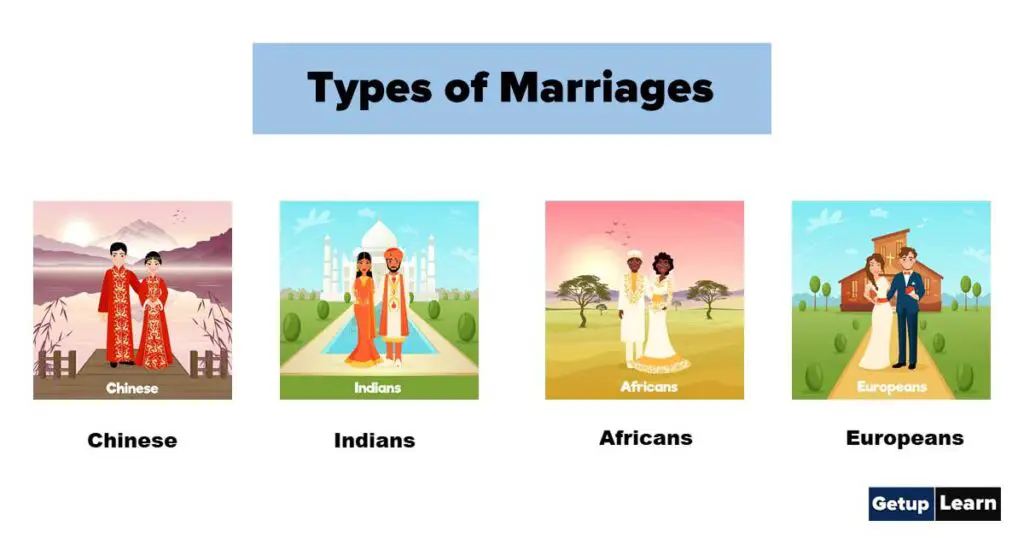Table of Contents
- 1 What are Marriages?
-
2 Types of Marriages
- 2.1 Monogamy
- 2.2 Polygamy
- 2.3 Group Marriage
- 2.4 Levirate Marriage
- 2.5 Widow Inheritance
- 2.6 Ghost Marriage
- 2.7 Woman-to-Woman Marriage
- 2.8 Gift or Charity Marriage
- 2.9 Child-to-Child Marriage
- 2.10 Pawn Marriage
- 2.11 Wife Capture or Elopement
- 2.12 Cross Cousin or Parallel Cousin Marriage
- 2.13 Sororate and Sororal Polygyny
- 3 FAQs About 13 Types of Marriages
What are Marriages?
As a relation of one or more men to one or more women which is recognized by custom or law and involves certain rights and duties both in the case of parties entering the union and in the case of children born of it. types of marriages

Table of Contents
Marriage is a legally and socially sanctioned union, usually between a man and a woman, that is regulated by-laws, rules, customs, beliefs, and attitudes that prescribe the rights and duties of the partners and accords status to their offspring (if any).types of marriages
Types of Marriages
These are important types of marriages which are given below:
- Monogamy
- Polygamy
- Group Marriage
- Levirate Marriage
- Widow Inheritance
- Ghost Marriage
- Woman-to-Woman Marriage
- Gift or Charity Marriage
- Child-to-Child Marriage
- Pawn Marriage.
- Wife Capture or Elopement
- Cross Cousin or Parallel Cousin Marriage
- Sororate and Sororal Polygyny
Monogamy
This is a form of marriage between one man and a woman. This implies that a man can have only one wife at a time. Should any reason arise for the man to marry another wife, the first marriage must be dissolved through a divorce or the death of a spouse. A man whose wife dies could marry another one in what is called serial monogamy.
Polygamy
A polygamy is a form of marriage in which a person has more than one mate. It is a plural marriage that involves one man having many wives or one woman having many husbands.
Polygamy has two sub-divisions:
- Polygyny
- Polyandry
Polygyny has to do with a man having more than one wife. Most traditional Nigerian societies practice this kind of marriage.
Polyandry involves a woman having more than one husband. This practice was dominant in parts of India and Tibet; the Lele of central Africa. However, Atemie (1994, 1999) reported that this practice is also common among the Irigwe in the Plateau State of Nigeria.
Polyandrous marriages involving siblings are referred to as „Fraternal’ or ‘Adelphic’ polyandry. On the other hand, there is another variant called „matriarchal polyandry’ where the woman stays at her house and her various husbands come to live with her in turns Goldthorpe (1981).
Group Marriage
As the name suggests, in this type of marriage all men share marital relations with a group of women. This implies that a group of men and women are married to one another. They all share reciprocal obligations, as is required in all marriages jointly. No one particular man owns a wife and vice versa.
Group marriages are often encouraged by fraternities or what they refer to as „solidarities‟ or special groupings. The philosophy may be not to discriminate but to share everything in common including belongings, aspirations, and sex and marriage partners.
Charles (2008) notes that the Oneida community of the 1960s in New York is often cited as one of such extreme fraternities that practised group marriage, and who frowned at individual or single marriage partnership. To them, single marriage thrives in selfishness and possessiveness, which were seen as sinful.
Levirate Marriage
The children from such a union belong to the dead brother. In other words, the dead brother is the „Pater‟ or „Social Father‟, while the living brother (the wife‟s new husband) is the „Genitor‟ or the „Biological Father‟. Another important reason for this marriage arrangement is to forestall the situation where the woman could possibly move out with or without children to another family through remarriage.
Widow Inheritance
In widow inheritance, the brother, son or close relative of the deceased husband inherits the wife for the same reasons as highlighted in levirate marriage. In this case, however, the widow is often requested to name the next-of-kin among the late husband‟s kinsmen whom she would want to live with as her husband.
Nevertheless, children gotten from such a union belong to the new husband and not the dead husband. Among the Ijos of the Niger Delta, this kind of marriage is called “Duere” (Ingiabuna 2003). This marriage type is also common among the Ibos, and Fulanis of Nigeria and some African and Asian societies.
Ghost Marriage
Ghost Marriage is a marriage arrangement whereby in other to perpetuate the name of a dead male member of a family, a living brother gets married to a woman on behalf of the dead brother who died a bachelor hence never had an opportunity to get married or raise a family.
In this case, the wife is socially married to the dead man whom she probably never knew and the children born belongs to the dead man who is the Pater (Social Father), while the living brother happens to be the Genitor (Biological Father).
Woman-to-Woman Marriage
In Woman-to-Woman Marriage, a wealthy barren woman acquires a wife by performing all traditional rites and paying appropriate bridewealth. The woman becomes the husband while the lady being married becomes the wife. The female husband determines the manner of allocation of her sexual favours by screening and approving her sexual partners.
Children born belong to the woman-husband who is the Pater (social father) while the man she arranged to raise children with the woman-wife is the Genitor (Biological father). This kind of marriage is sometimes practised among the Efiks and Kalabaris of the Niger Delta. Ibibio women also practice this kind of marriage to secure their place in the husband‟s house among co-wives.
Gift or Charity Marriage
In Charity Marriage marriage, parents give out one of their young daughters as a gift to their friends or patrons without any consideration as a demonstration of friendship, honour and total loyalty. In some African societies, the chiefs or kings enjoyed this honour and prerogative among subjects.
Among the Hausa people, a girl might be given away to her father‟s friends or chiefs if she abuses her virginity. Similarly, among the Kanuri of Nigeria, a charity marriage could be contracted between a virgin girl and a Mallam in appreciation to a religious functionary who performed the religious roles to benefit the family members in areas like; medicine, prayers, divination.
Child-to-Child Marriage
In Child-to-Child Marriage, parents of betrothed children make perfect the marriage pact as soon as the boy was of school age between 5-7 years. The children are formally married by their parents and allowed to grow under the watch for eyes of the parents.
Pawn Marriage
Pawn Marriage is a situation where a man cannot readily pay his creditor may give out his daughter as payment for debt owed. Okaba (2005) reported that among the Ijos, there was the practice of pawning girls maturing into puberty; she is espoused to the pawnbroker or his closest kin.
In this situation, there would be no payment of bridewealth and acceptance by the creditor reliefs the debtor of his debts. However, a father could not pawn away his daughter without the approval of the girl‟s maternal uncle, except in cases of high bridal transfer marriage systems.
Wife Capture or Elopement
Wife Capture is a situation when a young suitor captures or elopes with a girl he intends to marry. A suitor may capture a daughter if the parents of the girl refuse him marriage to the girl. The suitor, however, comes back later to properly marry the girl.
A man may capture a maiden on her way from or to the town market for her last marriage rites to her new home. If the usurper succeeds, he fires a gunshot into the air as he reaches home with the captive wife.
This act makes her a legitimate wife to the usurper and no new bridal payments are made. A form of elopement has been reported where a suitor may successfully elope with a man‟s daughter if the man refuses the suitor to marry his daughter.
Cross Cousin or Parallel Cousin Marriage
Cross and parallel cousin marriage are types of preferential and prescribed marriages; in preferential marriage, the societal law stipulates that a partner or close relative ought to marry another close relative in a particular generation or relationship, though it is not compulsory.
On the other hand, marriage partners could be rigidly fixed by the culture for a man to take his spouse from among relatives in a given society. This is called prescribed marriage. In cross-cousin marriage, the marriage is simply between children of siblings of the opposite sex. Therefore this type of marriage could involve children of brothers and those of their sisters, vice versa.
When a man marries a daughter of his mother‟s brother he is said to have marked his matrilateral cross-cousin. If he is married to a daughter of his father‟s sister, he is having a patrilateral cross-cousin. In either of these marriages, the partners in marriage do not share the same patrilineage and they do not share the inheritance.
On the other hand, parallel cousin marriage involves children of siblings of same-sex. That is a man marries his father‟s brother‟s daughter. All partners, in this case, belong to the same patrilineage or matrilineage as the case may be.
Sororate and Sororal Polygyny
Sororate marriage is culturally opposite to levirate marriage. the sister of the dead wife is culturally required to marry the late sister‟s husband, (serial monogamy).
While in sororate polygyny, one husband is free to choose many sisters in marriage, as in the case in the Bible when Jacob married Leah and Racheal. This marriage system is also found among the Zulus of Southern Africa.
This they do because they assume that the jealousy which generally engulfs plural wife marriage is neutralized by sisters who share the same parents and presumably common aspirations.
FAQs About 13 Types of Marriages
What are the 13 types of marriages?
These are the 13 types of marriages:
1. Monogamy
2. Polygamy
3. Group Marriage
4. Levirate Marriage
5. Widow Inheritance
6. Ghost Marriage
7. Woman-to-Woman Marriage
8. Gift or Charity Marriage
9. Child-to-Child Marriage
10. Pawn Marriage.
11. Wife Capture or Elopement
12. Cross Cousin or Parallel Cousin Marriage
13. Sororate and Sororal Polygyny.
YOU MIGHT ALSO LIKE
- What is Anthropology?
- Branches of Anthropology
- What is Social Anthropology?
- Scope of Social Anthropology
- Nature of Social Anthropology
- What is Social Cultural Anthropology?
- Theories of Sociocultural Anthropology
- What are Archaeological Sites?
- Types of Archaeological Sites
- What is Linguistic Anthropology?
- What is Marriage?
- Types of Marriage
- What is Family?
- Types of Family in Sociology
- Functions of the Family
- Folk literature
- What is Biological Anthropology?
- Biological Anthropology Fields of Study
- What is Social Anthropology?
- Definition of Social Anthropology
- Scope of Social Anthropology
- Nature of Social Anthropology
- What is archaeology?
- What is Archaeological Anthropology?
- Process of Archaeology
- Types of Archaeology Sites
- Linguistics Language
- Linguistic Culture
- Types of Marriages
- What is Kinship?
- Types of Kinship Groups
- What is Folkloristic Anthropology?











